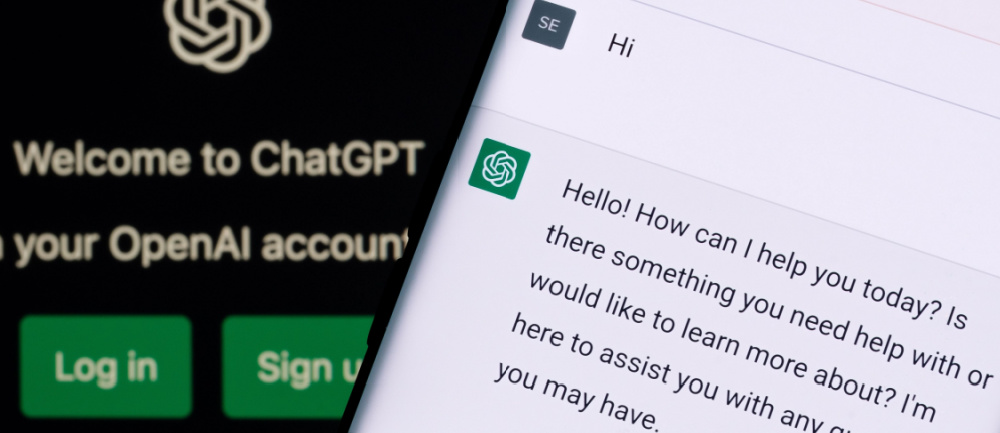Driving HR innovation: Unleashing the power of AI and ChatGPT
- 6 Min Read
ChatGPT has catapulted AI into our collective consciousness. Executives should use this use case as a catalyst to position AI as an asset in their businesses, out in the open.
- Author: David Lancefield
- Date published: Feb 27, 2023
- Categories


The recent explosion of interest in ChatGPT has put Artificial Intelligence (AI) into the mainstream. Its ability to create “human-like text responses to a wide range of questions and prompts” has led to its use in writing emails, memos, essays, and advice.
It has also sparked our imagination about the possibilities of using AI more widely and systematically in business and reminded us of its limitations.
AI has been powering our professional and personal lives for some time now. Look at how your sales, marketing, R&D, finance, and, yes, HR functions and you’ll find that AI is an integral part of the software you use. The same goes for your shopping, banking, utilities, music, and TV consumption at home.
Fiona Tan, CTO of Wayfair, the shopping platform, said: “it’s under the covers, and you don’t realize, but what is actually powering the entire experience that you have as a customer — and then also for our suppliers.”
Nevertheless, AI is still viewed with suspicion. Will it take my job? Answer: For some people, yes, potentially. But it could replace some of your mundane tasks, freeing you up to do more stimulating work.
So, what would it take for AI to be considered an asset, rather than something sinister, secretive, or substitutional?
Start at the top – in the Board and Executive Committee
There’s a lot of confusion and ignorance about AI. The top decision-makers in the Board and Executive Committee need to understand the definitions and applications of AI. Invest the time to read the briefings (like this one from Steve Blank), apply readily available toolkits (like this one from the World Economic Forum), listen to the experts, and immerse yourself in applications as you would to understand the operational backbone of the organization. AI is more than a single use case, or a technology – it is a system of algorithms, data, and the experts involved.
Daniel Hulme, Chief AI Officer of WPP and Founder of Satalia defines AI as: ‘goal-directed adaptive behavior‘. In other words, intelligent systems that adapt their own processes in real-time to optimize for a business goal. Therein lies the opportunity and concern – the possibility to benefit from dynamic learning at scale but also the limitations of systems you cannot fully understand or predict. AI can also replicate activities conducted by employees through automation (although this is not strictly AI) and extract complex insights about behaviors and activities from the data.
Position AI at the same level as strategy, finance, risk, people in Board agendas. Avoid deferring to a chief digital or AI officer, if they exist, as this can be an excuse not to engage fully. Ultimately your role is to signal the importance of AI to the organization through the quality of your questions, the clarity of your decisions about where AI will and will not be used, and how it will be used responsibly.
Put AI specialists at the center of large initiatives
AI is used across a wide range of business activities: analysis, optimization, and prediction; generative (like ChatGPT); process automation; sensing; and cognitive capabilities (talking, visual recognition).
Therefore it’s hard to think of new strategic, commercial, or operational initiatives – such as starting a new partnership, launching a new product, or improving the supply chain – where AI couldn’t play a role. Make it a default capability.
Frame the decisions that need to be taken – such as the selection of partners, commercial terms, pricing, product design, or operational configuration. Invite the AI specialists (typically called data scientists), whether in-house (if you’ve managed to recruit them) or external advisors, to join these initiatives from the beginning. Encourage them to explore where AI can contribute and what it would take, for example in terms of the data requirements (which can be substantial). This signals the importance of the capability to the organization and stimulates interest in future applications.
Collaboration is key – wrap-around AI specialists with the relevant representatives from the business areas, software engineers, finance, risk management. Scope out a minimum viable product to test the use of AI, de-risking the activity, before considering a fuller adoption.
Communicate the uses, benefits, and limitations of AI
Explain how AI solves business problems, describe the benefits it generates (e.g., new, higher quality insights, delivered at speed), and outline the limitations – for example, the potential for bias introduced in the “training” data which could put certain groups at a disadvantage.
Give your functional or business leads this challenge: describe where AI is being used, to what end, and outline where people are in the loop (to provide checks) and when they’re not. For example, AI can inform dynamic pricing decisions, optimize marketing expenditure, improve resourcing decisions, and screen CVs in the recruitment process but decisions on all of these activities are taken by people.
Identify the most influential, informal leaders in the business – especially those who are known to be “high value” and “difficult” – and encourage them to share their experiences of using AI. People think “if they see the benefits, I better jump on board too”.
Encourage (including time and money) people to learn about the applications of AI through online off-the-shelf learning programs, many of which are free, and experiments; Google has developed a platform that provides a “showcase for simple experiments that make it easier for anyone to start exploring machine learning, through pictures, drawings, language, music, and more.”
Coach people to practice ‘new’ skills
Plenty has been written about how AI gives employees an opportunity to refresh and develop the skills they can deploy better than AI – expressing empathy, showing creativity, and expressing doubt or dissent. That’s easy to say but often leaves people wondering what to do with it. Some will feel anxious, especially in organizations where the hierarchical, managerial culture has limited their willingness and ability to use them.
Develop programs of training and coaching in each of these subjects, encouraging people to think more deeply, listen more attentively, and express their opinions with more vigor and personality. Use role models – and rainmakers – in each of these areas to share their wisdom. Encourage people to start at first principles, search for examples from other industries or ecosystems, and reframe the problems they face. Recognize their effort as much as their impact as they practice these skills.
Learning these ‘new’ skills will not only enhance individual and collective productivity but will also increase the likelihood that AI will be viewed positively – as a nudge for upskilling and progression.






